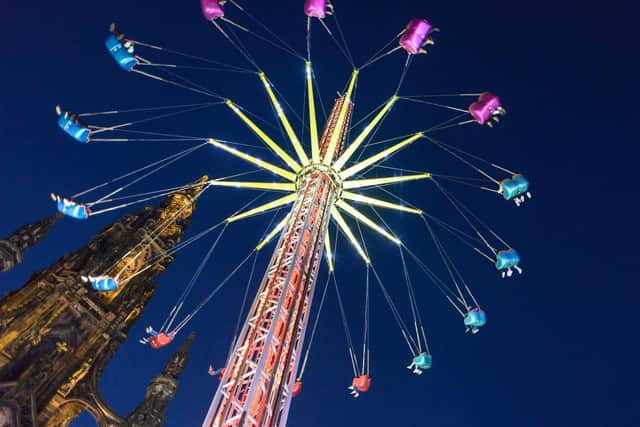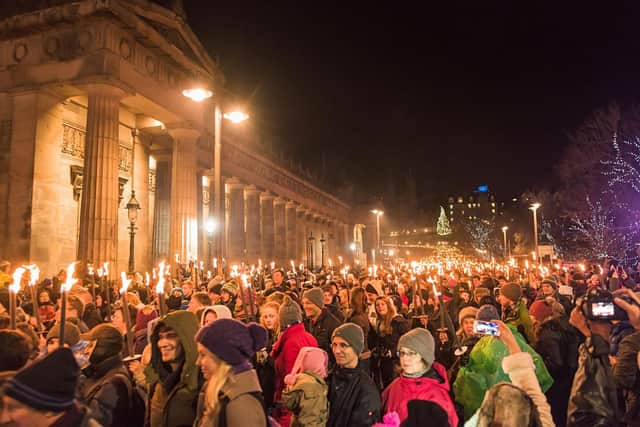Hogmanay: What is Hogmanay? When is it, Scottish history and traditions and how to pronounce Hogmanay
and live on Freeview channel 276
Now when we think of Hogmanay, we think of massive New Year’s parties, drunken singing and Auld Lang Syne, and we have images of the Edinburgh Street Party, fireworks exploding over the Castle.
Christmas wasn’t a public holiday in Scotland until the 1950s with locals celebrating the New Year as their main winter holiday.


What does Hogmanay mean? And how do you pronounce it?
Advertisement
Hide AdAdvertisement
Hide AdIt’s pronounced Hog (as in hog) Man (which rhymes with ham) and Nay (which rhymes with hay). Hogmanay. It is not completely clear where the word comes from and there have been many different spellings over the year.
In 1693, in Scotch Presbyterian Eloquence, it was suggested that it comes from Greek for Holy Month. There are possible French and Gaelic etymologies too, as well as a Norse one. The Norse versions are closest to the word we know today, and is a reference to tales involving elves and trolls.
We have been marking Hogmanay in Scotland for centuries, with many traditions building up over the years.


When is Hogmanay?
Hogmanay takes place every year on the last day of the year – December 31. It’s basically the Scottish celebration of the New Year. This year Hogmanay will take place on Saturday, December 31.
Hogmanay tradition: First Footing
Advertisement
Hide AdAdvertisement
Hide AdFirst Footing it thought to bring luck to the household. The first person to cross the threshold of your house after midnight on Hogmanay should be a dark-haired male. He should bring with him some coal, shortbread, salt, black bun and some whisky. This is thought to date back to the Viking invasions of the 8th Century.
Hogmanay tradition: The Saining
In the Highlands, people would sprinkle ‘magic water’ from a river around the house. They would then burn the branches of juniper in all the rooms until the household were coughing, and were forced to open the windows to let in the fresh air. This would cleanse and protect the house and livestock.
Hogmanay tradition: Giant Fireballs
In Stonehaven, fireballs are swung from metal poles before being thrown into the harbour. People come from all over to see the bright spectacle which is thought to have originated from when people were marking the winter solstice. The fireballs are thought to represent the sun.
Hogmanay tradition: Fire
Fire has strong links to Hogmanay, again, due to the connection with the winter solstice, and is thought to date from the Celts and then the Vikings. Edinburgh is one of many places across the country that hosts a torchlight procession
Hogmanay tradition: Auld Lang Syne with lyrics
Advertisement
Hide AdAdvertisement
Hide AdThe words date from before Robert Burns made them popular. This is a tradition that has spread across the world – singing Auld Lang Syne at the bells and marking the moment as a time to remember old friends.
The words to the song were written of course by great Scottish poet Rabbie Burns. They go like this:
Should auld acquaintance be forgot
And never brought to mind?
Should auld acquaintance be forgot
And days of auld lang syne?
For auld lang syne, my dear
For auld lang syne
We'll tak a cup o' kindness yet
For days of auld lang syne
We twa hae run about the braes
And pu'd the gowans fine
But we've wander'd mony a weary fit
Sin days of auld lang syne
And we twa hae paidl'd I' the burn
Frae morning sun 'til dine
But seas between us braid hae roar'd
Sin days of auld lang syne
For auld lang syne, my dear
For auld lang syne
We'll tak a cup o' kindness yet
For days of auld lang syne
And surely ye'll be your pint-stowp
And surely I'll be mine
And we'll tak a cup o' kindness yet
For auld lang syne
And there's a hand, my trusty fiere
And gie's a hand o' thine
And we'll tak a right gude-willy waught
For auld lang syne
For auld lang syne, my dear
For auld lang syne
We'll tak a cup o' kindness yet
For auld lang syne
For auld lang syne, my dear
For auld lang syne
We'll tak a cup o' kindness yet
For auld lang syne
Comment Guidelines
National World encourages reader discussion on our stories. User feedback, insights and back-and-forth exchanges add a rich layer of context to reporting. Please review our Community Guidelines before commenting.